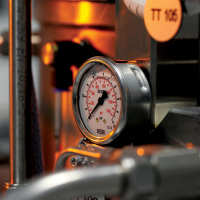The modules of the Process Automation, Instrumentation and Control part-time postgraduate programme (can also be taken as CPD)
 Please use the links to visit the relevant pages for detailed descriptions of each of the 16 modules in terms of objectives and syllabus content. Coherent subsets of modules may be offered to companies as one-day and two-day short courses, please email our marketing manager. Brief outlines of each module are available below. For full module descriptions, please use the links on the left hand side of the page.
Please use the links to visit the relevant pages for detailed descriptions of each of the 16 modules in terms of objectives and syllabus content. Coherent subsets of modules may be offered to companies as one-day and two-day short courses, please email our marketing manager. Brief outlines of each module are available below. For full module descriptions, please use the links on the left hand side of the page.
Modules offered on the programme
- Advanced Process Automation
- Advanced Process Control
- Batch Processing and Automation
- Chemical Engineering Principles
- Classical Control Systems Design
- Control Schemes and Strategies
- Control Systems Technology
- Dynamics and Control of Distillation Columns
- Fuzzy, Neural and Expert Systems
- Instrumentation and Measurement
- Management of Automation Projects
- Mathematics and MATLAB
- Modelling and Simulation
- Modern Control Systems Design
- Optimisation and Scheduling
- Process and Analytical Technology
Advanced Process Automation
- Computer integrated manufacturing
- Materials resource planning
- Open systems
- Relational databases and SQL
- Multivariate statistics
- Multiple linear regression
- Principal component analysis
- Statistical process control
Advanced Process Control
- Identification and estimation
- Least squares methods
- Kalman filtering
- Adaptive and self-tuning control
- Minimum variance
- Extended horizons
- Model predictive control
- Recursive implementation
- Integration with optimisers
- Non-linear control
Batch Processing and Automation
- Structure of batch plant
- Sequence control
- Structured text
- Sequential function charts
- S88 physical and procedural models and constraints
- Recipe and activity models
- Complex batch
- Requirements and specifications
- Batch project management
- Software QA
Chemical Engineering Principles
- Survey of unit operations
- Mass and energy balances
- Use of steam
- Stoichiometry
- Recycle processes
- Fluid flow pumps and piping
- Heat transfer and exchangers
Classical Control Systems Design
- Transfer functions
- Block diagram algebra
- Characteristic equation
- Frequency response
- Bode stability criterion
- Root locus
- Significance of poles and zeros
Control Schemes and Strategies
- Feedback control
- Effect of PID settings
- Controller tuning
- Cascade, ratio and feedforward control strategies
- Translation of P&I diagrams into block diagrams
- Process of determination
- Schemes for the control of unit operations
Control Systems Technology
- Overview of systems architecture and software
- Communications
- Open systems security
- Operator interface and human factors
- I/O channels and signals
- Configuration
- Hazard analysis
- Layers of safety
- Reliability
- Protection system design
Dynamics and Control of Distillation Columns
- Process design of columns
- Operational characteristics
- Mass and energy balance schemes
- Composition control
- Reboiler and reflux controls
- Pressure control
- Dynamics: vapour, liquid and composition lags
- Interactions
Fuzzy, Neural and Expert Systems
- Membership functions
- Production rules
- Multi-layer perceptrons
- Radial basis function networks
- Training
- Knowledge – based systems
- Inheritance
- Inferencing
- Functionality, benefits and applications
Instrumentation and Measurement
- Use of differential pressure cells
- Measurement of flow, level, weight, pressure and temperature
- Valve characteristics and sizing
- Fieldbus
- Intrinsic safety
- System layout
Management of Automation Projects
- Project lifecycle overview
- Cost s and benefits analysis
- Requirements specifications
- Model forms of contract
- Project and system management
- Quality and TQM
Mathematics and MATLAB
- Use of Laplace transforms
- Numerical methods
- Statistics
- Vectors, matrices and matrix algebra
- Eigenvalues and eigenvectors
- Introduction to MATLAB and Simulink
Modelling and Simulation
- First principles model development
- Linearisation and deviation variables
- Assumptions and approximations
- Process and plant models
- Transfer function and state-space models
- Input-output relationships
- Dynamic simulation
Modern Control Systems Design
- Sampled data systems
- Pulse transfer functions
- Impulse compensator design
- Pole cancellation
- State space models
- State feeedback and observers
- Multivariable controllers
- Introduction to model reference control and adaptive control
Optimisation and Scheduling
- Linear programming
- Simplex method
- Steepest descent
- Lagrangian functions
- Constraint handling
- Quadratic programming
- Real time optimisers
- Integration with predictive controllers
- Branch and bound
- Genetic algorithms
Process and Analytical Technology
- Chromatography
- Infrared spectroscopy
- Online analysers
- Manual and automated sampling
- Calibration, validation and operation
- Analyser technology
- Electrochemical measurements
- Sensors for gas species
- Emissions monitoring
- Pharma applications
- Oil and gas applications
- Introduction to chemometrics